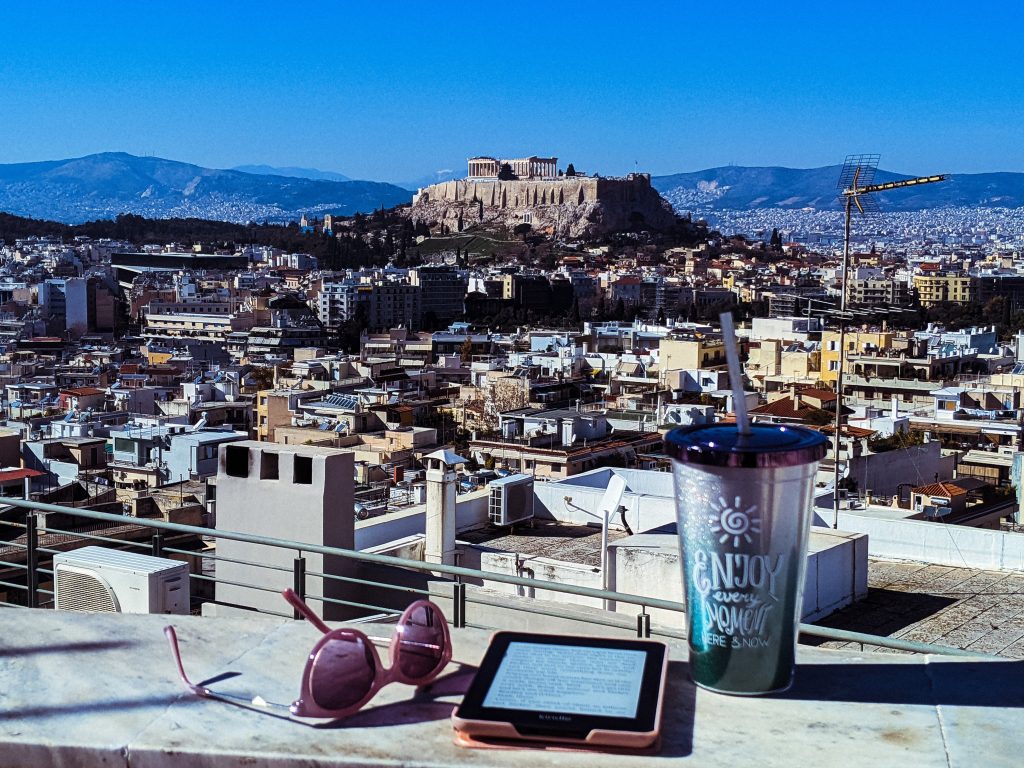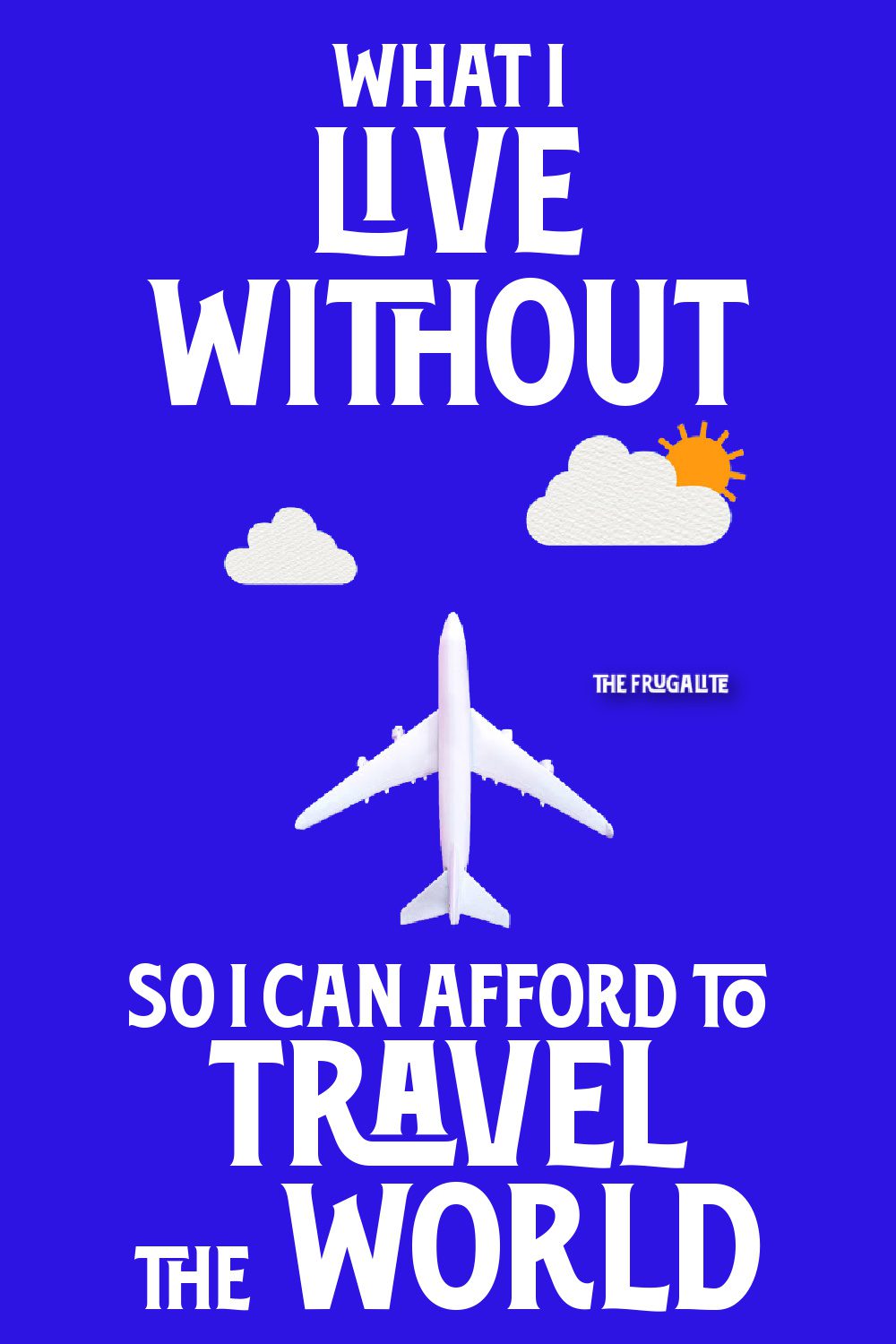(Psst: The FTC wants me to remind you that this website contains affiliate links. That means if you make a purchase from a link you click on, I might receive a small commission. This does not increase the price you’ll pay for that item nor does it decrease the awesomeness of the item. ~ Daisy)
I live in a large European city with a view of a famous ancient monument from my rooftop patio, where I enjoy coffee in the morning and a glass of something as the sun sets every evening. I eat out regularly. I often travel by plane, using my apartment here as my hub.

When you put it that way, it sounds like I’m filthy rich, living a frivolous and expensive life.
But I’m not. I’m just a single mom with adult kids making a relatively average amount of money. I don’t fund any of this with credit cards. Everything I do is paid for at the time I do it, as opposed to buy-now-pay-later. So, you may be wondering, how on earth I can swing a lifestyle like the one described above.
It’s because I prioritize my spending to meet Big Goals. And that is not without certain sacrifices. I was inspired by Colette’s recent article to write this one when I began traveling again.
How to reach Big Goals on a small budget.
I’ve written before about how I traveled full-time before Covid hit, but I think the subject is due for an update. Many of us are watching our spending power dwindle, and it’s a tough reality that things just aren’t like they used to be. However, it doesn’t mean that you have lost any chance of reaching your dreams.
It’s all about prioritization.
Ever since I was a little girl, I dreamed of living a life where I could see the world, travel to exotic places, and meet fascinating people. I wanted to explore this beautiful planet we live on, and I wanted to see art and ancient wonders. I feel as though I was never meant to stay in one place.
Now, that doesn’t sound terribly frugal, and this is a frugality blog. But to me, frugality is the tool that opens the door to your dreams. And everyone’s dreams are different. My story doesn’t have to be your story for you to get something out of it. My goals don’t need to be your goals.
This is a principle we’re talking about. Not a how-to manual.
To be able to live in different places around the globe and travel regularly, I had to change a lot of things that are typical for American women in their 50s. I had to stop spending money on some things so I could spend money on other things. But to me, my Big Goals are worth it. Whether your Big Goal is to be financially independent at an early age, to be able to pay off your house in a fraction of the time of your mortgage term, or to allow one parent to stay home with the kiddos, you can use the same principles to reach your dreams.
More important than the money that I spend is the money that I don’t spend.
Here’s what I don’t spend money on.
I mentioned that I gave up a lot of typical things in order to travel. Here are a few of them.
A home in the US
I no longer have a home in the United States, and that takes a huge expenditure out of my budget. As a renter, I learned that the lease on my nice apartment in North Carolina was about to skyrocket at renewal time. I lived near the Research Triangle, where a lot of tech companies have their Eastern base. As new companies moved into the area, rents began to escalate dramatically. There’s no law in North Carolina stating that your lease can only increase X percent at renewal time so landlords are free to raise it as much or as little as they want.
So, when I saw that I’d be spending an extra $600 a month to stay put, I decided that was my sign to get up and go.
By no longer having a home in the US, I have no rent, no mortgage, no property taxes, and no insurance costs. I also have none of the maintenance and utility costs from a home there.
All that money is now in my European budget.
A vehicle
I passed on my beloved Jeep Esther to my daughter. Man, I love that Jeep. I’ve had her for quite some time. She was my transportation across the country repeatedly and also during my year in Mexico. Esther rules.
But I still owe a bit of money on my vehicle. And of course there’s insurance, maintenance, and all that other stuff. My daughter is happy to get a reliable vehicle that is nearly paid off and I’m glad that Esther stays in the family.
All the money for car payments, insurance, and vehicle maintenance has been reallocated to my European budget.
A big wardrobe
Like most women, I had a lot of clothing back in the US. Tons of shoes, loads of dresses, pants, and shirts. Special occasion items, purses, jewelry, pajamas and other nightwear, socks, coats, jackets, sweaters…you know the drill.
Now, every item of clothing I possess fits into two suitcases, aside from a few special occasion items that were left in storage in the United States.
I have a capsule wardrobe with items that all coordinate, making my limited wardrobe feel bigger than it is. I don’t bring in one thing without getting rid of another thing. And since I really like everything I brought, it would have to be a very special item for me to part with any of it. I have only a few pairs of shoes – probably more than sounds reasonable until you remember that I walk everywhere because I don’t have a car. (You’d be surprised how fast your shoes wear out if you wear them every day and walk an average of 6-10 miles per day.)
I sold lots of nice clothing on Facebook Marketplace before I left, passed some on to my girls, and donated the rest. Since I rarely buy clothing now, again, that money goes to my European budget.
A house full of furniture and personal possessions
When I came back to the US a few years ago, I quickly furnished my new apartment using FB Marketplace, thrift store finds, and new items here and there. I pulled my books and art out of storage, added a bit more, and lived in a beautifully decorated home.
Now every single piece of furniture is gone, minus the 3 pieces I inherited from my father. Those reside in my storage unit along with my book collection, art, and odds and ends from travel.
Everything else was sold, and it funded my legal fees to relocate, my deposits, and my transportation to Europe. It also gave me a little added cushion in my savings account.
So, I only own three pieces of furniture now. Everything else is gone, and I have no reason to spend much at all on home goods here in Europe. I’m a chronic bookworm, and I keep all of my reading material on my Kindle.
Here’s what I do spend money on.
Now you know what I don’t spend money on. Here are the things I do spend money on. A lot of this is simple geoarbitrage. I make American money in a place with a lower-than-American cost of living.
A cheap apartment in an expensive building
I kept in contact with a lot of people from when I traveled full-time before, and as luck would have it, my favorite Airbnb of all time was vacant. I quickly made a deal with the owner to rent the apartment in Athens, Greece for a longer term. It costs less than half of the price of my apartment back in the United States. It is in the basement of a very nice building, where upper-floor apartments with a view of the Acropolis sell for close to a million dollars.
However, from my apartment, the only view is my little walled garden. I find that to be just about as wonderful as a non-stop view, and already have plans for growing some tomatoes and herbs back there in the summer. I spend a lot of time there working under the shade of the olive tree and enjoying the lovely Grecian weather.
The bonus to this building is that, because of the expense of the fancier suites, the lobby is beautifully maintained. As well, everyone in the building has access to a rooftop patio, and from there, I have my million-dollar view.

I have yet to run into another person up there enjoying the view, so it feels like it’s my own private domain. I like to pop up there in the morning with coffee, and later at night to watch the sun setting over the horizon. It’s a cost-nothing way to remind me of how lucky I am to be here. (And we all know the importance of gratitude.)
Location was also very important to me. I live in a very walkable neighborhood, and nearly everything I could want is within a fifteen-minute stroll. That includes groceries, personal items, cafes, and the historic district, which is a lovely way to pass the time.
Transportation
Of course, some things are outside the realm of a reasonable stroll. Some transportation is necessary. I use either the metro (subway) or take an Uber. I rarely spend more than five bucks on an Uber ride. And that’s not the only option. I haven’t purchased it yet because I haven’t needed it, but I can get an unlimited Ath.EnaCard for the equivalent of $30 US. This entitles me to unlimited transfers on city buses, trolley-buses, trams, the metro, and the suburban railway, excluding trips to and from the airport. If I want the ability to go to the airport using my pass, I’d be spending about $50 monthly.
Compared to the cost of having my Jeep in the US, this is really a small amount. As well, being out there walking to most places is so much healthier.
Eating out
One thing I love about travel is experiencing the culture. And part of that culture is savoring the delicious cuisine. Greece has some of the most wonderful food in the world (trust me, it’s not souvlaki and pitas all day every day.) I eat out frequently in Europe.
Here’s the thing about dining out here. I set myself a food budget for overall eating. That includes what I eat at home and what I eat out. I can choose to blow the whole kahuna at an expensive restaurant or tourist trap, or I can check out the smaller, quirky places that the locals go. I’m sure you can guess which one I choose. A meal out here, with the tip, is generally $10 or less.
I eat breakfast and snacks at home every day. I bring home my leftovers from restaurants, which usually provide a second meal. And I go to restaurants 3-4 times per week. If it fits in my budget, why not? If I needed to, I could easily dial back my cafe jaunts to once or twice per week.
Additional travel
One of the reasons that I chose Athens as my hub in Europe is that it’s quite inexpensive to travel to other places from here. I can get to nearly any major airport in Europe from the Athens airport for about $100 round trip. When I pair that with a transportation pass (taking a car to or from the airport is $40 each way), I can take one short trip every month or two.
I chose locations based on seasonality. I like to go during the “shoulder season” because it’s less crowded and accommodations cost less. I bring only a carry-on for these trips and transport some snacks and instant coffee packets.
This allows me to see the world on a much tighter budget than traveling from the United States.
How it all works out
When I look at my budget back in the United States and compare it to my budget here in Europe, I’m spending nearly $500 a month less than I was living in North Carolina. And I’m getting to achieve my dreams while doing it. (If you enjoy travel photos, you might enjoy my Instagram.
Obviously, if I still had children at home or a job in a fixed location this would not work out. Everyone’s situation is different. I hope that you can apply these philosophies to your own life and circumstances to reach your own “unachievable” Big Goals.
I gave up a lot of things others might never want to part with to get to that point. It’s like Colette wrote about in this article. But that’s the whole premise: I’m happy to do without those things to have these other things.
So the real question is, what are you willing to live without to live the life you really want? What Big Goal do you dream of reaching? Would you ever consider making dramatic cuts to reach a Big Goal? Have you done it? Let’s discuss it in the comments.












7 thoughts on “What I Live Without So I Can Afford to Travel the World”
Daisy,
I’m glad you wrote this article! I love to travel! I’d like to travel much more than I do now. You are inspiring me to do something about it!
Life is short! I choose to take the trip 🙂
“Not all those who wander are lost” J.R.R. Tolkien. Prioritizing your life goals makes sense!
A wonderful article Daisy. Thank You.
You are living your dream and saving money on rent.
Can you comment on how you handle health insurance in Greece. The availability of doctors for you in case you need one. Annual checkups etc.
What about language problems. Does most everyone speak English. When going to restaurants or shopping are menus and signs all in Greek?
Is converting from dollars to Euros easy.
Paying with credit cards easy?
Ordering items online and getting delivery easy?
Are the Persians still trying to conquer Greece? 🙂
Those are awesome questions!
Health Insurance: I have a general plan for serious issues that cost about $100 for the year. It includes a product to help me return to the US in case of a medical emergency. I was unable to afford any health insurance in the US and didn’t qualify for Marketplace healthcare plans, so for me this is a step up. Also, for regular care it’s much less expensive here. I see a physical therapist for an ankle injury for $30 per session. A standard doctor’s appointment ranges between $20-40. There is a website with English-speaking doctors to help you find care.
Language: Nearly everyone under 40 or so speaks a bit of English because it’s taught in schools. I use Google Translate A LOT and I’m working hard to learn the language. Having a different alphabet does make it harder. Most restaurants have menus in both Greek and English aside from the really small, home-cooking kinds of places. There it can be hilarious for both the server and me to try and get food but I’m not picky and just try to roll with the surprise.
Money conversion: The cheapest and easiest way to do this remains the humble ATM machine. Yes, there are fees on both ends but it’s far less than going into a conversion place with cash.
Credit cards: People here REALLY like cash because taxes are so high. I rarely use my card unless I’m ordering online.
Ordering online: There are sites that are similar to Doordash for restaurant food and groceries. I just placed my first mail order and we’ll see how it goes!
So far, I’ve seen nobody out trying to conquer the city, but I’ll keep you posted! ?
I am a 78 year old mostly retired man. I have been from Tibet to Moorea. Great article on long term travel. I have lived on a sailboat and wandered without plans which is my favorite way to travel. I now live in your former state both in Raleigh and the mountains. I travel when I want to with credit card points Thanks
Great article! And it is all about the choices we make. I couldn’t live without my cocker spaniel, so I see a small RV in my future. Most are fully appointed so my travel “stuff” will go with me. I have thought of a sailing catamaran-some people love their small traveling homes. Usually, it is just wonderful to get out and see changes. It makes me sad that so many apartments and homes are viewed as just “temporary shelter” by the owners. No one sees anything as a long term investment; it’s all profit right now! -especially large corporations.